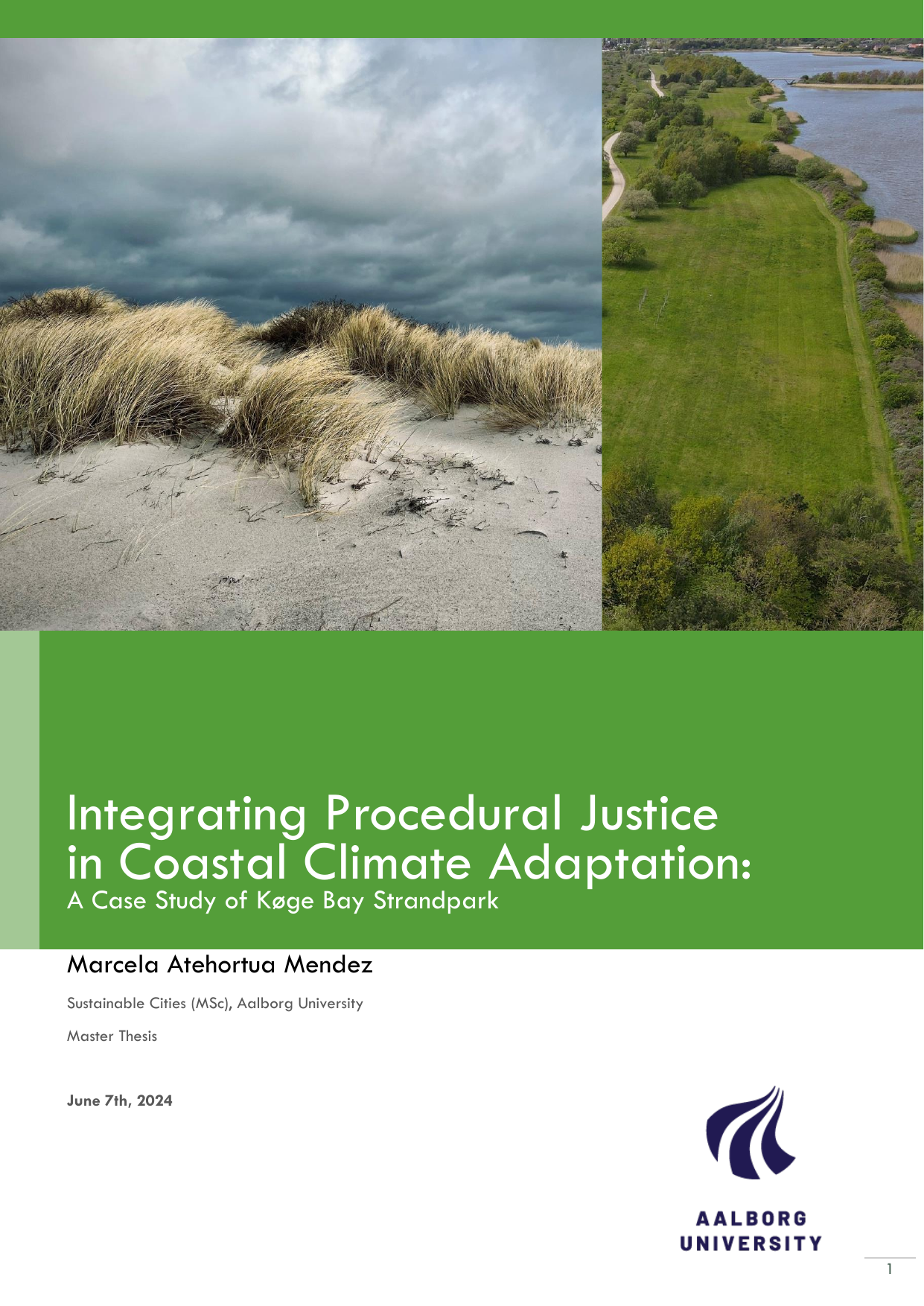
Integrating Procedural Justice in Coastal Climate Adaptation: A Case Study of Køge Bay Strandpark
Term
4. term
Education
Publication year
2024
Submitted on
2024-06-07
Pages
65
Abstract
I de seneste diskussioner om klimatilpasning er manglen på effektiv interessentinvolvering og klimaretfærdighed i planlægningen og gennemførelsen af kystklimatilpasningsprojekter blevet fremhævet. Denne afhandling udforsker den kritiske rolle af interessentinvolvering i at sikre proceduremæssig retfærdighed i disse projekter, med specifikt fokus på moderniseringsprojektet ved Køge Bugt Strandpark. Den primære forskningsspørgsmål undersøger, hvordan interessentinvolvering kan sikre proceduremæssig retfærdighed i sådanne projekter, ved brug af naturbaserede løsninger (NBS) som ramme. For at adressere dette overvejer undersøgelsen tre delspørgsmål: kriterierne, der er nødvendige for optimal proceduremæssig retfærdighed, de lokale beboeres opfattelse af proceduremæssig retfærdighed i projektet, og andre interessenters synspunkter.Undersøgelsen anvendte en blandet metode, der kombinerer kvalitative og kvantitative datainsamlingsmetoder, herunder spørgeskemaer, semistrukturerede interviews og dokumentanalyse. Resultaterne understreger kløften mellem de teoretiske idealer for proceduremæssig retfærdighed og de praktiske implementeringsudfordringer, såsom begrænsede ressourcer, bureaukratiske hindringer og sociokulturelle barrierer. At bygge bro over denne kløft kræver en pragmatisk og kontekstspecifik tilgang, herunder udvikling af målrettede opsøgende programmer, levering af ressourcer og støtte til deltagelse, samt kontinuerlig overvågning og evaluering af involveringspraksis.Moderniseringsprojektet ved Køge Bugt Strandpark illustrerer potentialet for at tilpasse teoretiske principper med praktiske strategier og derved skabe mere modstandsdygtige og retfærdige bymiljøer. Denne forskning bidrager til den bredere diskurs om klimaretfærdighed og bæredygtig byplanlægning, og fremhæver vigtigheden af inkluderende og transparente beslutningsprocesser for at opnå social retfærdighed og miljømæssig bæredygtighed.
In recent discussions about coastal climate adaptation, the lack of effective stakeholder engagement and climate justice in the planning and execution of this projects has been highlighted. This thesis explores the critical role of stakeholder engagement in ensuring procedural justice in these projects, with a specific focus on the re-modernization project at Køge Bay Strandpark. The primary research question investigates how stakeholder engagement can ensure procedural justice in such projects, using Nature-Based Solutions (NBS) as a framework. To address this, the study considers three sub-questions: the criteria necessary for optimal procedural justice, local residents' perceptions of procedural justice in the project, and the views of other stakeholders. The research employed a mixed-methods approach, combining qualitative and quantitative data collection methods, including surveys, semi-structured interviews, and document analysis. The findings underscore the gap between theoretical ideals of procedural justice and practical implementation challenges, such as limited resources, bureaucratic hurdles, and socio-cultural barriers. Bridging this gap requires a pragmatic and context-specific approach, including developing targeted outreach programs, providing resources and support for participation, and continuously monitoring and evaluating engagement practices. The Køge Bay Strandpark re-modernisation project illustrates the potential for aligning theoretical principles with practical strategies, thereby creating more resilient and equitable urban environments. This research contributes to the broader discourse on climate justice and sustainable urban planning, highlighting the importance of inclusive and transparent decision-making processes in achieving social equity and environmental sustainability.
Keywords
Documents
